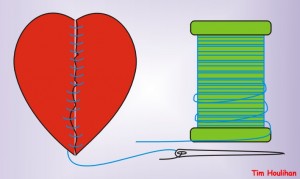Loving Again After Losing A Lover

The love-life rule is, you have to heal your heart before you can love again. You might try to get around this. Chances are you’ll get stuck with a chronically broken heart. This is not good. It will remain as a barrier in your love-life.
Why is this true? This is the way we humans are built. When the heart gets broken, it needs to be fixed before it can function again. Just like your physical heart. If your physical heart needs repair you’ll find a medical doctor to work on it.
When love is lost, the ’emotional heart’ gets broken and needs repair. In many instances a person can heal his or her heart without having to see a psychologist. You can do this for yourself as long as we have a clear idea of what healing your heart requires. You can be your own ‘heart doctor.’
How do I heal my heart? Accepting that your heart is broken may seem like a small thing to you, but I reassure you it’s not. The denials and resistance that can occur when a person doesn’t want to admit that his or her heart is broken, to say the least, will delay and/or interfere with the necessary healing. So acceptance is number one.
Next, you have to understand the emotion we call ‘grief.’ It’s not just when someone physically dies but it also applies to when someone emotionally ‘dies’ or leaves us. Basically, grief occurs whenever a person loses love. Now here’s the hard part. If you don’t welcome grief it hangs around making trouble for your health and well-being.
I’ve seen unresolved grief turn into all kinds of symptoms and illness. Look at it this way, grief is the flip-side of love. If you love someone you’ll grieve if that person leaves you. Knowing how to grieve makes love easier and healthier. If you’re afraid of grief you’ll probably be afraid of love as well. Remember, one is the flip-side of the other.
Here’s your crash course on grieving the loss of love. Know that grieving a loss is a natural experience, as natural as rain. Know that your mind and body already know what to do. You have to let it happen. This is one of those experiences where you have to ‘get out of your own way.’
Here’s the rule to remember, if you welcome grief when it needs to happen, it will come and go for a while and lessen in intensity over time. Find a quiet place to cry. Never humiliate yourself with criticism because you have feelings. Crying and feelings of loss are human, respect them, and the whole experience stays healthy.
What tells me my heart is not healed yet? If your heart is broken and it has not healed, you’ll have trouble loving again after the loss. Most people who try to live with a ‘broken heart’ end up doing either or both of the following things: distancing themselves from love and/or rebounding.
Distancing from love simply means you will stay away from, avoid, downplay, scare off, get rid of, etc. any further opportunities to love. The reason for that is simple, who wants to get hurt again in the same place?
There is an injury or bruise on your heart and it hurts if someone new ‘touches’ it. As long as that bruise is there you will be shying away from love. It makes sense. Your heart needs to heal for you to be able to love again.
Rebounding involves bouncing in and out of relationships after a loss. Because your heart is broken you won’t be able to stay put for very long, even though some people stay in rebounding relationships longer than others. The point is, your broken heart is in the way.
The tragic part is you may have met someone after a loss that could offer you a great love relationship. But you are not emotionally ready for what is being offered.
You know you’re in a rebounding cycle when the person you lost shows up in your thoughts, feelings, and actions while with other eligible men or women. You get out of the cycle when your heart heals. Unfortunately, an unhealed heart can rebound indefinitely.
What tells me my heart is healed? You’re healed when the grief you’ve allowed has passed, you start feeling better, and you’ve begun to feel attracted to potential lovers. Once again, your mind and body know what to do. You just have to read the signs, know what’s happening, and most of all, get out of your own way!
Comments? Welcome. Dr. Tom Jordan
